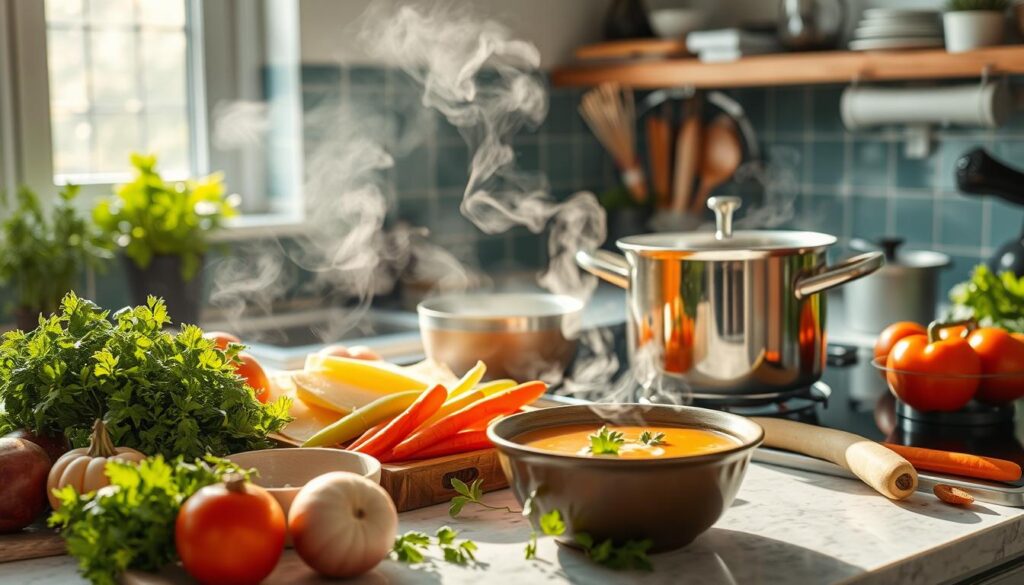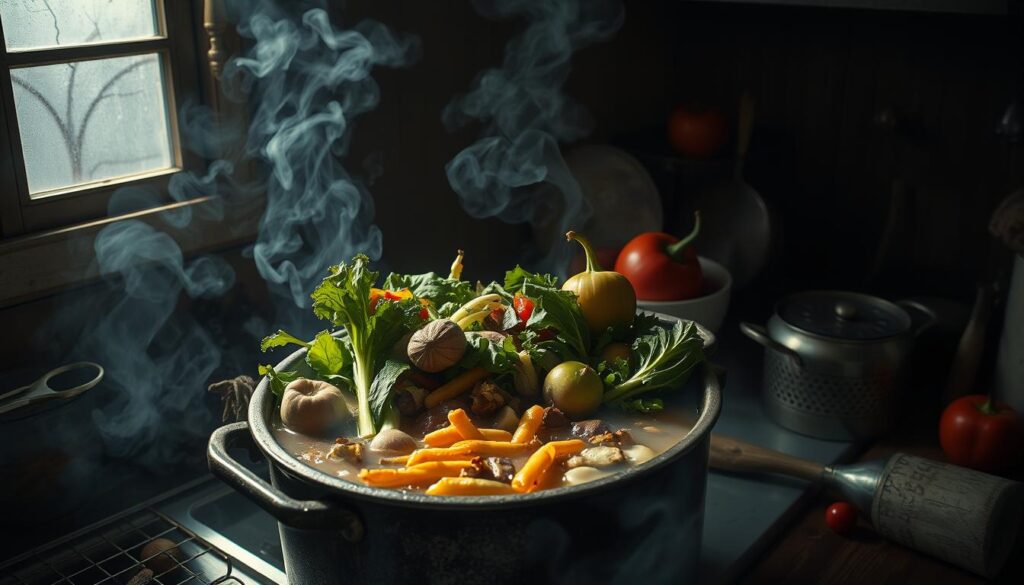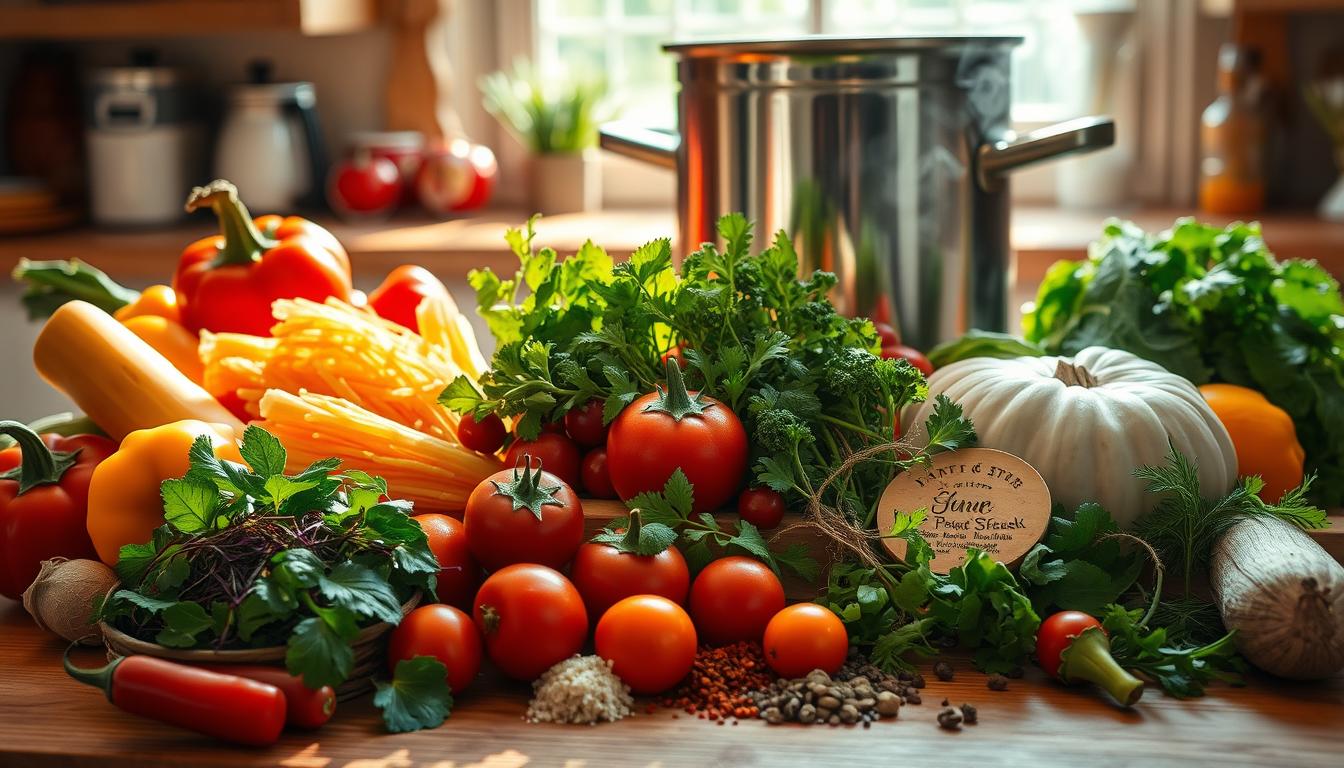As the sun sets, casting long shadows, a warm bowl of soup becomes a tempting idea. In Abiotic Factor, where survival is key, making tasty soups can mean the difference between life and death. Let’s explore the art of soup-making in this harsh world and discover the power of this simple dish. If you’re on the hunt for Soup Recipes Abiotic Factor inspiration, you’ve come to the right place!
Table of Contents
Key Takeaways
- Cooking Level 3 is required to make Soup in Abiotic Factor
- Soup recipes offer various effects, from restoring Hunger and Thirst to providing buffs
- Incorrect ingredient combinations can result in Bad or Weird Soup with weaker restorative properties
- Harmful Soups like Poop Soup, Toxic Soup, and Killer Soup can cause sickness or even death
- A variety of recovery and buffing Soups can be crafted using common ingredients
Understanding the Basics of Cooking in Abiotic Factor
Cooking in Abiotic Factor is very important. You need a cooking level of at least 3 to make nourishing soups. With the right skills and tools, you can make delicious soups quickly.
Required Cooking Level and Skills
Cooking starts at level 3 in Abiotic Factor, allowing you to make soup. Jobs like Epimedical Bionomicist and Phytogenetic Botanist can boost your cooking skills. If you have the Hobbyist Chef trait, your cooking points double, helping you level up faster.
Essential Equipment for Soup Making
To make soup, you need a few key items. A portable stove is essential for cooking anywhere. A cooking pot is also vital for mixing and simmering your soup. And, you must have a reliable source of clean water for safety and nutrition.
Basic Ingredients and Water Sources
Soup ingredients in Abiotic Factor can be diverse, from meats to vegetables. It’s important to use the freshest ingredients for your recipes. For water, you can find it in sinks, water coolers, or purify tainted sources.
“Cooking in Abiotic Factor is all about adapting to your environment and using the resources at hand to create nourishing meals that can sustain you in this harsh landscape.”
Getting Started with Soup Recipes Abiotic Factor
Start your soup-making adventure in Abiotic Factor. First, you need a Cooking Pot and a stove. Put clean water or Antejuice in the pot and heat it up. Then, add your favorite ingredients.
As you try new things, you’ll find new soup recipes. These will be added to your Compendium. But, not all mixes will taste good. Some might even make a “Bad Soup”.
Each soup you make can feed 4-6 people, depending on your skill. Use a Soup Bowl to collect your meals. These bowls will keep you full and hydrated in Abiotic Factor.
“The Reddit post titled ‘All Soups/Recipe’s Currently Available’ by user melvin4556 sparked interest within the gaming community focused on Abiotic Factor.”
Remember, finding new recipes can be both fun and hard. Some players get upset about hard-to-find recipes. But, others love the challenge and creativity of making soup.
The community loves to share and talk about their soup-making experiences. This shows how much they enjoy the craft in Abiotic Factor.
So, put on your apron and start cooking! With some experimentation and a good sense of taste, you’ll make delicious soups. These will not only feed you but also make your taste buds happy in Abiotic Factor.
Essential Equipment and Tools for Soup Making
Making delicious soups in the game needs the right tools. Having the right equipment makes a big difference. It affects your cooking experience and the soup’s quality.
Portable Stove Setup
You’ll need a reliable heat source to cook your soup. The Portable Stove is key, made from 2x Coil, 4x Plastic Scrap, 4x Metal Pipe, and 1x Keyboard. It lets you simmer your soup ingredients to the perfect temperature, even in tough spots.
Cooking Pot Types and Uses
After getting your heat source, you’ll need a good Cooking Pot for your soup. The standard Cooking Pot works well, but you can also make a Makeshift one from easier-to-find materials. Choose a pot that can handle the heat and hold your soup’s volume.
Importance of Proper Soup Bowls
No soup-making is complete without the right Soup Bowls. Made from 1x Metal Scrap, 1x Stapler, 1x Glass Scrap, and 1x Test Tube, these bowls are both functional and enhance your dining experience. The right bowl can make your soup look and taste better.
With the right equipment like a Portable Stove, Cooking Pot, and Soup Bowls, you’ll master abiotic factor cooking. You’ll make tasty cooking methods for your soup recipes in the game.
| Equipment | Crafting Recipe | Purpose |
|---|---|---|
| Portable Stove | 2x Coil, 4x Plastic Scrap, 4x Metal Pipe, 1x Keyboard | Provides a heat source for cooking soup |
| Cooking Pot | N/A | Holds the soup ingredients during the cooking process |
| Makeshift Cooking Pot | Crafted using more readily available materials | Serves as an alternative to the standard Cooking Pot |
| Soup Bowl | 1x Metal Scrap, 1x Stapler, 1x Glass Scrap, 1x Test Tube | Provides a functional and visually appealing way to serve the soup |
Understanding Water Sources and Preparation
In the world of cooking, clean water is key for tasty soups. As a chef, knowing your water sources and how to prepare them is important. This knowledge helps make your soups the best they can be.
The Water Cooler in kitchens is a reliable source. It gives you clean, purified water for soup. You can also use the Sink for tap water. Just boil it to get rid of any bad stuff.
If you find Tainted Water, don’t worry. Boil it at a 4:1 ratio to make it safe for soup. This way, your ingredients stay fresh, and your soup is safe to eat.
You might also find Antejuice as a water substitute. Try different water sources to find what works best for you. This lets you experiment and find your favorite ways to cook.
Using Water Bottles can make cooking easier. They help you add water to your pots without hassle. Good water management is key to making great soups and keeping them safe to eat.
“Mastering the art of water sourcing and preparation is the key to unlocking the full potential of your soup recipes in the abiotic world.”
Beneficial Soup Recipes and Their Effects
In your cooking space, you can make many nourishing soups. These soups can give you the energy and strength you need. They come in many flavors, from meaty stews to tasty vegetarian dishes.
Meaty Stew Variations
The Meaty Stew is a satisfying choice. It fills your hunger by 40 points and quenches your thirst by 22 points. It also gives you the Heightened Senses effect. This helps you see and hear better, spotting dangers or finding food.
Vegetarian Soup Options
If you prefer plant-based foods, there are many vegetarian soups. The Bland Pea Soup and Simple Tomato Soup fill your hunger and thirst by 20 points each. The Simple Tomato Soup also makes you feel happy and energized.
Special Effect Recipes
Some soups have special effects. The Sustenance Soup, made from Military M.R.E. rations, gives you 20 hunger and thirst points. It also gives you Quick Reflexes, helping you react fast. The Sweet Porridge gives you a sweet treat, boosting your mood.
Looking for a hearty stew, a healthy vegetarian soup, or something with a special effect? The abiotic factor has many soups to keep you going on your journey.
Advanced Cooking Methods for Better Results
In Abiotic Factor, learning advanced cooking can really boost your game. By using special cooking methods and managing resources well, you can make dishes that taste great. These dishes not only fill your hunger and thirst but also give you game benefits.
Using job bonuses, like the Somatic Gastrologist’s +4 cooking bonus, can help a lot. Adding the Hobbyist Chef trait boosts your cooking experience points. This lets you level up faster. Also, checking the pot of solder near The Blacksmith can increase your Cooking skill to level 3. This unlocks the ability to make nourishing soups.
As your Cooking skill grows, so does the quality of your dishes. At levels 5-9, you make “carefully cooked” dishes. Levels 10-14 get you “well cooked” meals. And at level 15 or higher, you can make “beautifully cooked” masterpieces. These dishes restore hunger and thirst better, giving you a survival advantage.
| Cooking Skill Level | Dish Quality | Hunger/Thirst Restoration |
|---|---|---|
| 5-9 | Carefully Cooked | Improved |
| 10-14 | Well Cooked | Significantly Improved |
| 15+ | Beautifully Cooked | Greatly Improved |
By mastering these cooking techniques, you’ll have a powerful culinary tool. It will keep you and your character strong. Try out different soups and ingredients to find the best dishes for your playstyle and the challenges in Abiotic Factor.

Managing Hunger and Thirst Through Soup Making
In the harsh world of Abiotic Factor, food and water are key to survival. Soup recipes can help manage hunger and thirst. They are a valuable asset for players in this challenging environment.
Hunger Fill Rates
Most basic soups in Abiotic Factor offer 8-12 edible portions per pot. As your cooking skills grow, you can unlock recipes that increase portions. For example, the A&L Mega-Stew can provide up to 444 hunger replenishment, nearly 2 full hunger bars from one pot.
The average soup recipe, like Sustenance Soup or Sweet Porridge, restores about 23 hunger points. This makes them a great way to manage hunger and stay fueled for adventures.
Thirst Management Systems
Soups not only fill your belly but also help manage thirst. Recipes like Greyeb Chowder and Meaty Stew restore a lot of thirst. They are essential for survival in Abiotic Factor.
Some soups, like Balanced Stew and Veggie Stew, offer additional buffs. These can enhance your performance or provide other benefits. These specialized recipes can be very useful in specific situations, helping you tailor your soup choices to your needs.
| Soup Recipe | Hunger Restore | Thirst Restore | Additional Buffs |
|---|---|---|---|
| Sustenance Soup | 20 | 20 | Quick Reflexes |
| Sweet Porridge | 23 | 32 | Sweet Tooth |
| Meaty Stew | 62 | 20 | Heightened Senses |
| Greyeb Chowder | 32 | 63 | Desire of the Flesh |
| A&L Mega Stew | 74 | 24 | Mega-Ante Buff |
| Balanced Stew | 22 | 21 | Big Brain |
| Veggie Stew | 45 | 43 | Living off the Land |
By using soup recipes, you can manage hunger and thirst well. This ensures survival in the abiotic factor food recipes and navigating the seasonal variations of Abiotic Factor.
Avoiding Harmful Soup Combinations
When making soup in abiotic factor environments, it’s key to avoid bad ingredient mixes. The wrong soup can make you sick or even worse. Let’s look at the soups to avoid and why.
Toxic Soup, made with rotten or plastic, can make you very sick. Poop Soup, made with feces, is not only sickening but smells bad too. The worst is Killer Soup, with glass or tech scrap, which can be deadly.
Even safe-looking soups can go wrong if ingredients aren’t mixed right. A Bad Soup has a 50% chance of making you sick. To stay safe, avoid using harmful stuff like human parts, glass, or ammo in your soups.
| Soup Type | Ingredients | Potential Consequences |
|---|---|---|
| Toxic Soup | Rotten Food, Plastic Scrap | Causes Sickness |
| Poop Soup | Feces | Causes Sickness and Stinkiness |
| Killer Soup | Glass Scrap, Tech Scrap | Can Cause Death |
| Bad Soup | Incorrect Ingredient Combinations | 50% Chance of Causing Sickness |
Knowing the dangers of bad soup mixes and being careful with ingredients makes soup-making safe and tasty. Enjoy your abiotic factor soup adventures!

Maximizing Cooking Experience Points
In the world of abiotic cooking, improving your skills is key. It unlocks new recipes, better food quality, and cooking bonuses. By mastering skill progression, you can take your cooking to new levels.
Skill Level Progression
Cooking XP comes from cooking, baking, and making soups. As you do these, your skills grow. This unlocks new recipes and benefits. For example, at level 3, you can make soups. At level 10, you get to use the Convection Oven and make raw dough for baking.
Cooking Proficiency Benefits
As your skills get better, you’ll see real benefits. Better cooking means your food will restore more hunger and thirst. Traits like Hobbyist Chef can even double your Cooking XP, speeding up your progress.
FAQ
What is the required Cooking Level to to Make Soup Recipes Abiotic Factor?
To start making Soup Recipes Abiotic Factor, you need to reach level 3. At this level, you can unlock soup-making.
What essential equipment is needed for making Soup Recipes Abiotic Factor?
You’ll need a Portable Stove, Cooking Pot, and Soup Bowl for soup making. The Portable Stove is made from 2x Coil, 4x Plastic Scrap, 4x Metal Pipe, and 1x Keyboard.
What are the basic ingredients and water sources to Make Soup Recipes Abiotic Factor?
You can use meats and vegetables as basic ingredients. Water comes from sinks, water coolers, or purified tainted water. Jobs like Epimedical Bionomicist, Phytogenetic Botanist, and Somatic Gastrologist offer cooking bonuses.
How do you start making Soup Recipes Abiotic Factor?
To make soups, fill a Cooking Pot with clean water or Antejuice. Place it on a powered stove and add ingredients. Recipes are added to the Compendium. But, unknown combinations might make Bad Soup.
What are the sources of clean water for soup making in Abiotic Factor?
Clean water is key for soup-making. You can find it in Water Coolers and Sinks. Tainted Water can be purified at a 4:1 ratio. Antejuice is also a good substitute. Water Bottles can add water to pots.
What are some examples of beneficial soup recipes in Abiotic Factor?
Good soups include Meaty Stew, Pest Goulash, and Veggie Stew. Meaty Stew gives 40 hunger and 22 thirst. Pest Goulash offers 30 hunger and 10 thirst. Veggie Stew gives 20 hunger and 20 thirst.
What are some advanced cooking techniques in Abiotic Factor?
Advanced techniques include using job bonuses and the Hobbyist Chef Trait. These can double Cooking XP. Cooking to level 3 can be achieved by analyzing the pot of solder near The Blacksmith.
How do soups efficiently manage hunger and thirst in Abiotic Factor?
Soups are great for hunger and thirst management. Most soups give 8-12 edible portions per pot. High-level cooking can increase portions to 6 per pot. A single pot can replenish up to 444 hunger (with A&L Mega-Stew).
What are some examples of harmful soup recipes in Abiotic Factor?
Bad soups include Toxic Soup, Poop Soup, and Killer Soup. Toxic Soup is made with Rotten Food or Plastic Scrap. It causes sickness. Poop Soup is made with Feces and causes sickness and stinkiness. Killer Soup is made with Glass or Tech Scrap and can be deadly.
How can players maximize Cooking Experience Points in Abiotic Factor?
Cooking XP is gained by cooking, baking, and making soups. As you progress, you unlock new recipes and bonuses. The Hobbyist Chef Trait doubles Cooking XP gain.

